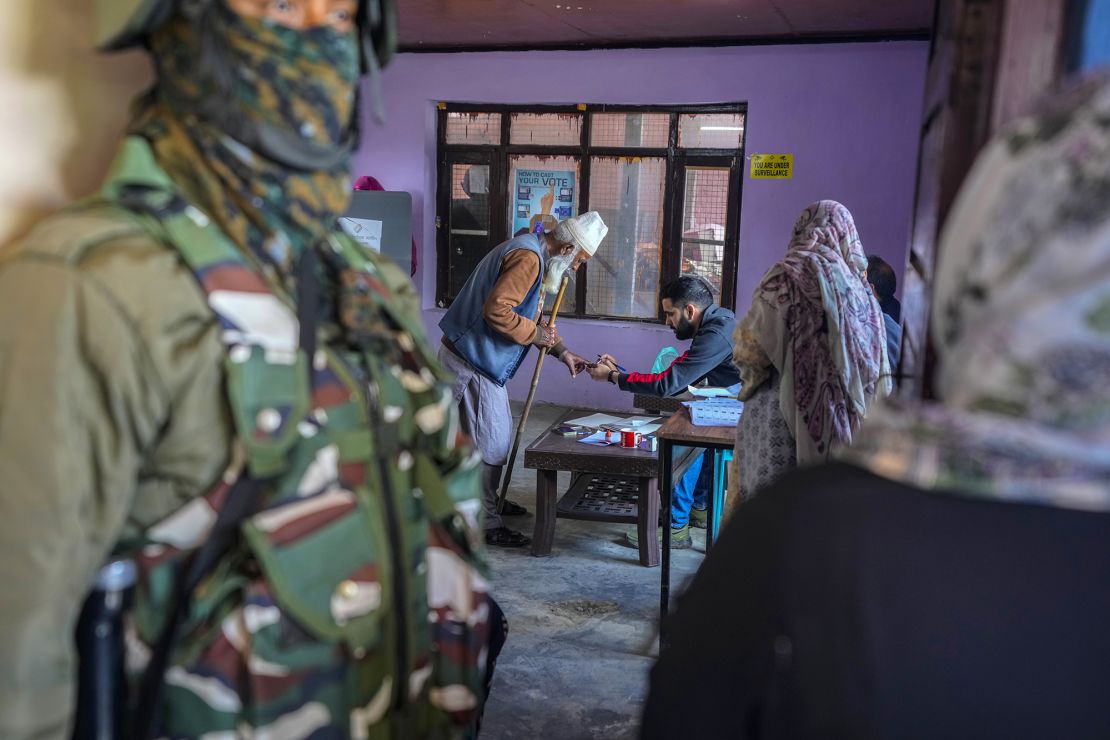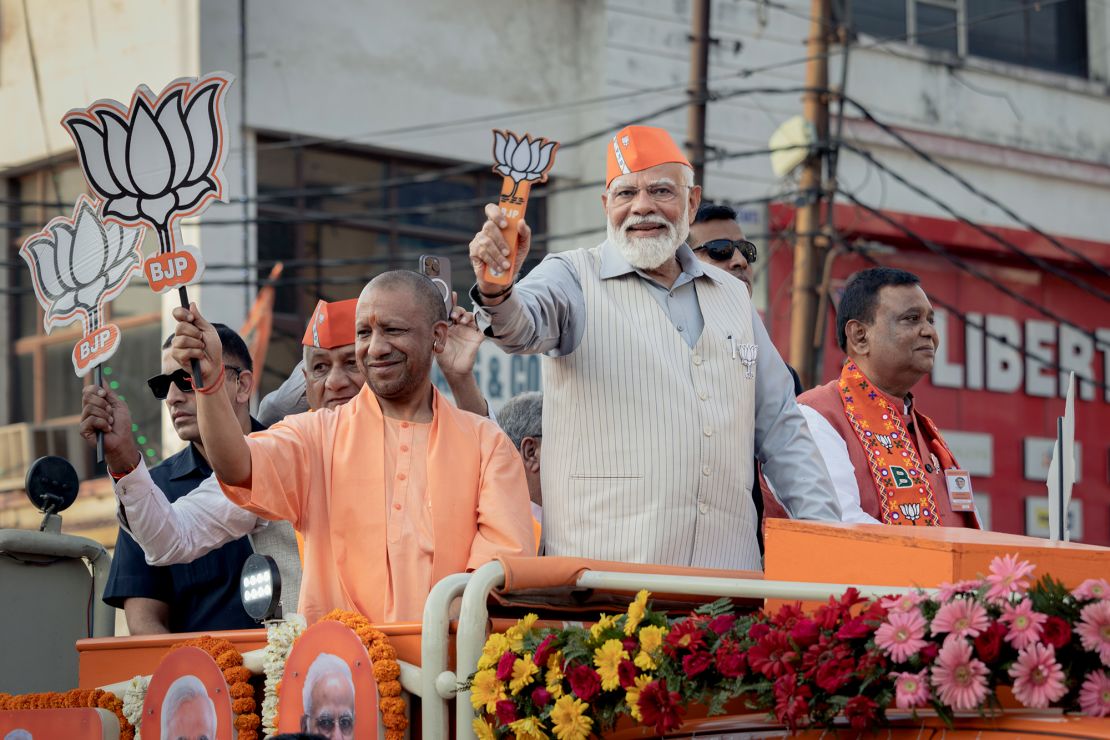Editor’s Note: Ziya Us Salam is an associate editor at newspaper The Hindu and author of “Being Muslim in Hindu India.” The views expressed in this commentary are his own. Read more CNN Opinion.
It has not been easy being a Muslim in Narendra Modi’s India. With the ruling Bharatiya Janata Party (BJP) steadfastly refusing to allow my community even a token representation in corridors of power, India’s largest minority, the third largest Muslim population in the world, is left voiceless.
For the first time since India’s Independence in 1947, the ruling party did not have a single Muslim Member of Parliament.
Tuesday’s election results, in which Prime Minister Modi sealed a rare third term, only enhance the sense of gloom and doom for Indian Muslims like me. My community may once again not have an MP in the government.
With the BJP back in power – albeit without the supermajority it had vowed – my only hope lies in a politically weakened Modi now. A weakened Modi shall, hopefully, translate into a more robust India and more secure minorities.
It may still be a long haul though.
After the recently concluded, hate-driven campaign led by Modi himself, things may only get worse. As it was before the vote, India is poised to continue transforming itself from a secular democratic republic into possibly a Hindu majoritarian state, with reduced rights and presence of minorities in general – and of Muslims in particular.
If after Modi’s first victory in 2014, there was a sense of cautious hope, 10 years later, my Muslim community stands orphaned, not just jettisoned by the ruling BJP, but repeatedly marked out as the group responsible for the supposed ills of the nation. There is an overriding feeling of belonging to a group under siege.

The prime minister kickstarted the invidious campaign by calling India’s 200 million Muslims “infiltrators” in one of his early election speeches.
His vitriol was, to put it mildly, unprovoked; the state of Rajasthan where he delivered his divisive speech has a strongly guarded border with Muslim-majority Pakistan. The state has only sent one Muslim candidate to the Lok Sabha – the Lower House of Parliament – since the first election back in 1952.
In this year’s election, the two leading political parties, the BJP and the Indian National Congress (INC or, simply, “Congress”), did not give a ticket to a single Muslim to contest the elections in Rajasthan. Yet the invisible Muslim ghost was punched with relish by Modi. It’s worth remembering this is the man who, back in 2002, was the Chief Minister of the state of Gujarat when large-scale violence claimed over 1,000 lives, a vast majority of them Muslims. (Modi denied any wrongdoing, and the Supreme Court cleared him of complicity).
But let us return to 2024. As the 6-week-long election wore on, Modi mocked the Muslim community’s supposed high fertility rate and repeatedly targeted the community using the opposition – especially Congress – as a mere pretext, accusing it of reserving 15% of the Union Budget for Indian Muslims. (Congress rejected the claim).
Of course, Modi denied discriminating against Muslims, and in a widely televised interview claimed to have celebrated the Muslim festival of Eid with his friends.

Meanwhile the Islamophobia within the BJP hit a new low when the party’s promotional video showed caricatures of Congress party leaders placing an egg marked “Muslims” in a nest next to three eggs marked “SC,” “OBC” and “ST” (three lower caste groups). As the eggs hatch, Congress leader Rahul Gandhi is shown feeding “funds” to the chick wearing a skullcap while ignoring the other chickens. The allusion was not lost on anyone. The video ran for days on social media before the Election Commission wrote to Twitter to take action.
Muslims stood silenced by the unceasing vitriol. Some were intimidated. Others hoped the election would bring an end to BJP rule. It proved a false hope. The BJP’s much-hyped claim of getting over 400 seats in the Lower House of Parliament did not materialize. The party, in the end, needed help from allies, Telugu Desam and Janata Dal (United), to form a government for the third time in succession – a feat hitherto performed only by the first Prime Minister Jawaharlal Nehru’s Congress immediately after Independence.
Except for one candidate in the constituency of Kerala, the BJP refused to put up Muslim candidates. This had an unfortunate ripple effect with the number of Muslims getting tickets from other parties showing a decline.
The main opposition party, Congress, failed to put up a Muslim candidate in the capital, New Delhi, as well as in the commercial center Mumbai and in Mahatma Gandhi’s home state, Gujarat. In fact, the number of Muslim candidates put up by major political parties showed a steep decline, falling from 115 in the 2019 elections, to 78 in 2024.
In the days and months to come, things could get seriously tough for Indian Muslims. With the prime minister failing to condemn the frequent lynching of Muslim men by right-wing vigilantes since 2015, and state governments ruled by the BJP using bulldozers to demolish Muslim establishments as a means of cowing even the odd voice of protest, it is going to be a question of survival for my community.
Our food habits, clothing, education centers and places of worship are all likely to be under greater scrutiny, possibly even violent attacks in the days of come.
Get Our Free Weekly Newsletter
- Sign up for CNN Opinion’s newsletter
- Join us on Twitter and Facebook
Already, medieval Indian mosques, some as old as 900 years, are being contested by Hindu outfits in various courts. There have been noises that the world-famous Taj Mahal was originally a Hindu temple, and that the historic Qutb Minar in Delhi was built after demolition of temples.
A community which has seen the 16th century mosque, the Babri Masjid, become a Hindu temple during Modi’s second term has reason to fear the worst.
We’ve seen BJP leaders talking of closing Islamic seminaries across the states of Uttar Pradesh and Assam. In the state of Uttarakhand, a hurriedly cobbled together Uniform Civil Code is in place – essentially a single set of laws for all residents that does not take into account the customs or religious laws of different religions or minority groups. It could be the norm for the rest of India soon as the BJP tries to deny Indian Muslims the right to follow Islamic laws in civil matters, a right granted by the Indian Constitution.
With Hindu Rashtra a virtual reality, it is difficult to see a silver lining for Indian Muslims who chose pluralist India over the theocratic state of Pakistan at the time of Independence.
In the summer of 2024, my community stands betrayed, forsaken and forlorn.
